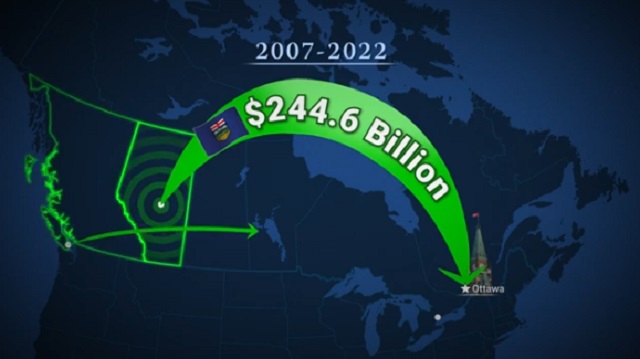Alberta
Albertans continue to contribute disproportionately to Canadian federalism

From the Fraser Institute
By Tegan Hill
Net contribution totaled $244.6 billion between 2007 and 2022
Between 2007 and 2022, Albertans continued to contribute disproportionately to Canadian federalism in terms of the amount of federal taxes paid versus federal spending in the province, finds a new study published today by the Fraser Institute, an independent non-partisan Canadian think-tank.
“It’s clear that Albertans continue to disproportionately contribute to the economic success of the country and to federal finances,” said Tegan Hill, director of Alberta Policy at the Fraser Institute and co-author of Understanding Alberta’s Outsized Contribution to Confederation.
Overall, from 2007 and 2022, Albertans’ contributed $244.6 billion to the federal government in taxes and other payments in excess of the money Ottawa spent or transferred to Alberta – more than five times as much as was contributed (on net) by either British Columbians or Ontarians. The other seven provinces, and most notably Quebec were net recipients of federalism, meaning the amount of revenues collected by the federal government in those provinces was exceeded by the amount of money spent or transferred by Ottawa back to the provinces.

“When Alberta’s economy is strong and prosperous, it benefits the entire nation,” commented Hill.
In 2022, Alberta’s inflation-adjusted GDP growth was the fastest in the country (5 per cent), it also reported the fastest private sector employment growth (7.8 per cent), the highest level of business investment per private sector worker ($36,412) and had the highest net interprovincial migration (56,245 people).
“It is the economic success of Alberta that leads to Albertans contributing more to Canadian federalism than other provinces, which is absolutely something to be encouraged rather than discouraged,” said Hill.
- When Alberta is economically strong, all Canadians benefit, because money is redistributed to other parts of Canada.
- In 2022, despite restrictive federal policies, Alberta continued to contribute disproportionately to the federation.
- Alberta’s 5.0% real GDP growth rate was the fastest in Canada in 2022, accounting for 17.9% of Canada’s real GDP growth, despite being home to 11.6% of the population.
- In 2022, 56,245 Canadian residents relocated to Alberta, representing more than 75% of total net in-migration within Canada.
- Alberta reported the fastest private sector employment growth among the provinces (7.8%) in 2022, accounting for 19.2% of private sector jobs created in Canada.
- Per private sector worker, Alberta attracted $36,412 of business investment, more than double the national average (excluding Alberta).
- From 2007 to 2022, Alberta’s net contribution to the federal finances totalled $244.6 billion—more than five times as much as BC’s ($46.9 billion) or Ontario’s ($41.9 billion). In 2022, Alberta contributed $14.2 billion more to federal revenues than it received back in federal spending.
- If Alberta were an “average contributor” based on the other provinces, rather than a large net contributor, the federal government would have had a fiscal shortfall of $16.9 billion in 2022. For perspective, to cover this net revenue loss, the federal GST rate would need to increase from 5.0% to 7.2%.
- Put simply, without Alberta’s oversized contribution to the federation, Canada would be worse off. To benefit all Canadians, the federal government should focus on supportive policies, not restrictive ones.
Authors:
Alberta
Energy sector will fuel Alberta economy and Canada’s exports for many years to come

From the Fraser Institute
By any measure, Alberta is an energy powerhouse—within Canada, but also on a global scale. In 2023, it produced 85 per cent of Canada’s oil and three-fifths of the country’s natural gas. Most of Canada’s oil reserves are in Alberta, along with a majority of natural gas reserves. Alberta is the beating heart of the Canadian energy economy. And energy, in turn, accounts for one-quarter of Canada’s international exports.
Consider some key facts about the province’s energy landscape, as noted in the Alberta Energy Regulator’s (AER) 2023 annual report. Oil and natural gas production continued to rise (on a volume basis) in 2023, on the heels of steady increases over the preceding half decade. However, the dollar value of Alberta’s oil and gas production fell in 2023, as the surging prices recorded in 2022 following Russia’s invasion of Ukraine retreated. Capital spending in the province’s energy sector reached $30 billion in 2023, making it the leading driver of private-sector investment. And completion of the Trans Mountain pipeline expansion project has opened new offshore export avenues for Canada’s oil industry and should boost Alberta’s energy production and exports going forward.
In a world striving to address climate change, Alberta’s hydrocarbon-heavy energy sector faces challenges. At some point, the world may start to consume less oil and, later, less natural gas (in absolute terms). But such “peak” consumption hasn’t arrived yet, nor does it appear imminent. While the demand for certain refined petroleum products is trending down in some advanced economies, particularly in Europe, we should take a broader global perspective when assessing energy demand and supply trends.
Looking at the worldwide picture, Goldman Sachs’ 2024 global energy forecast predicts that “oil usage will increase through 2034” thanks to strong demand in emerging markets and growing production of petrochemicals that depend on oil as the principal feedstock. Global demand for natural gas (including LNG) will also continue to increase, particularly since natural gas is the least carbon-intensive fossil fuel and more of it is being traded in the form of liquefied natural gas (LNG).
Against this backdrop, there are reasons to be optimistic about the prospects for Alberta’s energy sector, particularly if the federal government dials back some of the economically destructive energy and climate policies adopted by the last government. According to the AER’s “base case” forecast, overall energy output will expand over the next 10 years. Oilsands output is projected to grow modestly; natural gas production will also rise, in part due to greater demand for Alberta’s upstream gas from LNG operators in British Columbia.
The AER’s forecast also points to a positive trajectory for capital spending across the province’s energy sector. The agency sees annual investment rising from almost $30 billion to $40 billion by 2033. Most of this takes place in the oil and gas industry, but “emerging” energy resources and projects aimed at climate mitigation are expected to represent a bigger slice of energy-related capital spending going forward.
Like many other oil and gas producing jurisdictions, Alberta must navigate the bumpy journey to a lower-carbon future. But the world is set to remain dependent on fossil fuels for decades to come. This suggests the energy sector will continue to underpin not only the Alberta economy but also Canada’s export portfolio for the foreseeable future.
Alberta
Owner sells gas for 80 cents per litre to show Albertans how low prices ‘could’ be

Undoubtedly some of the motorists driving past The Whistle Stop Cafe at Mirror on Tuesday morning thought it was an April Fools prank. It wasn’t.
Chris Scott, owner of the gas station at The Whistle Stop Cafe offered a one day promotion on April 1st. Scott sold 8000 litres of regular gasoline for $0.80/ litre.
The promotion was funded by Scott and the Alberta Prosperity Project. In this video posted to his social media, Chris Scott explains why they did it.
-

 2025 Federal Election2 days ago
2025 Federal Election2 days agoPoilievre, Conservatives receive election endorsement from large Canadian trade union
-

 2025 Federal Election2 days ago
2025 Federal Election2 days agoRCMP Confirms It Is ‘Looking Into’ Alleged Foreign Threat Following Liberal Candidate Paul Chiang Comments
-

 2025 Federal Election1 day ago
2025 Federal Election1 day agoMark Carney refuses to clarify 2022 remarks accusing the Freedom Convoy of ‘sedition’
-

 2025 Federal Election1 day ago
2025 Federal Election1 day agoPM Carney’s Candidate Paul Chiang Steps Down After RCMP Confirms Probe Into “Bounty” Comments
-

 Censorship Industrial Complex2 days ago
Censorship Industrial Complex2 days agoFrance condemned for barring populist leader Marine Le Pen from 2027 election
-

 Business2 days ago
Business2 days agoBiden’s Greenhouse Gas ‘Greendoggle’ Slush Fund Is Unraveling
-

 2025 Federal Election1 day ago
2025 Federal Election1 day agoLiberal MP Paul Chiang Resigns Without Naming the Real Threat—The CCP
-

 Automotive1 day ago
Automotive1 day agoElectric cars just another poor climate policy










